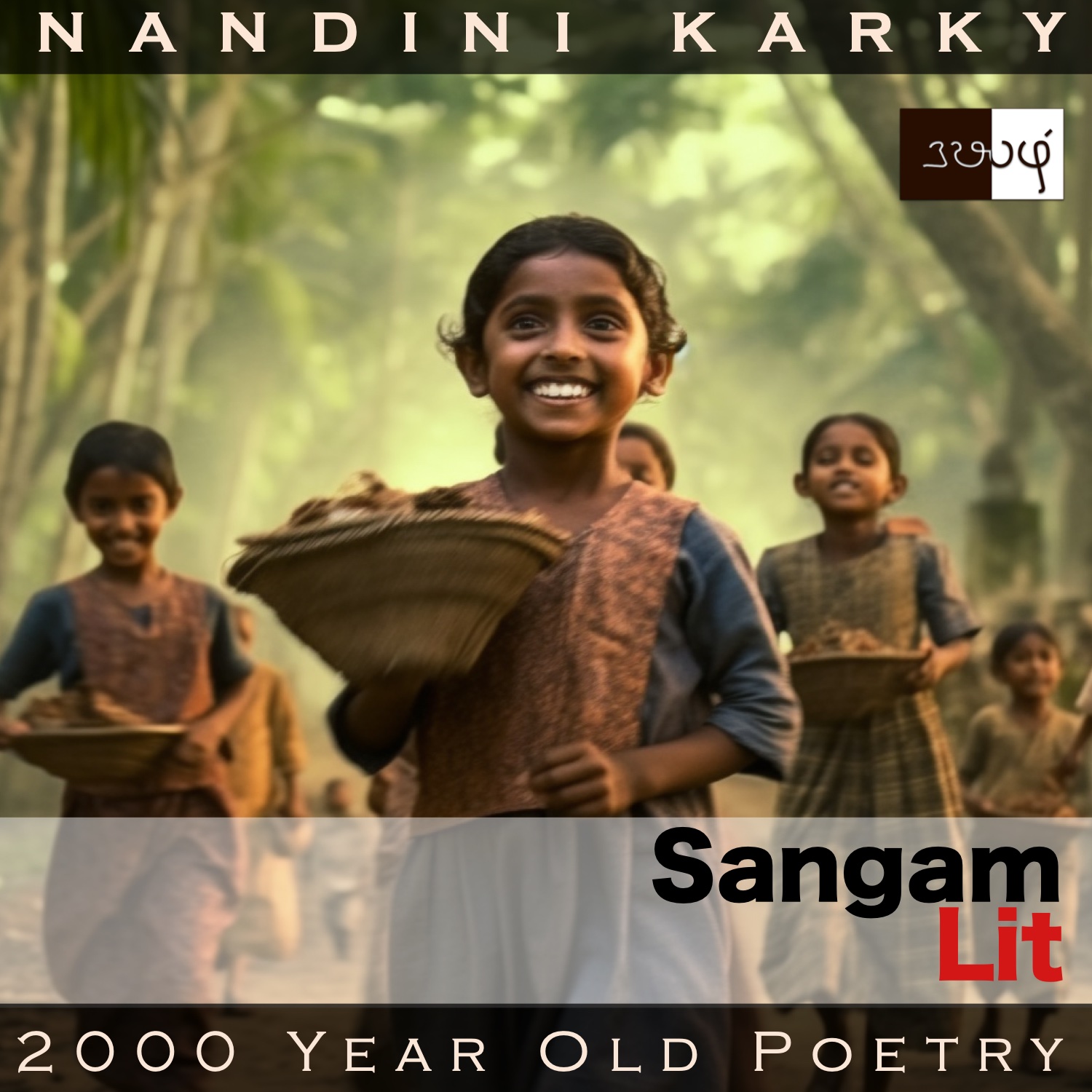Podcast: Play in new window | Download
Subscribe: Apple Podcasts | Spotify | Amazon Music | Android | iHeartRadio | Email | TuneIn | RSS | More
In this episode, we perceive scenes and sounds around a patron’s home, as portrayed in Sangam Literary work, Puranaanooru 173, penned about a local leader Sirukudi Kizhaan Pannan by the Chozha King Kulamutrathu Thunjiya Killivalavan. Set in the category of ‘Paadaan Thinai’ or ‘Praise’, the verse details the generosity of this leader.

யான் வாழும் நாளும் பண்ணன் வாழிய!
பாணர்! காண்க, இவன் கடும்பினது இடும்பை;
யாணர்ப் பழு மரம் புள் இமிழ்ந்தன்ன
ஊண் ஒலி அரவம்தானும் கேட்கும்;
பொய்யா எழிலி பெய்விடம் நோக்கி,
முட்டை கொண்டு வன் புலம் சேரும்
சிறு நுண் எறும்பின் சில் ஒழுக்கு ஏய்ப்ப,
சோறுடைக் கையர் வீறு வீறு இயங்கும்
இருங் கிளைச் சிறாஅர்க் காண்டும்; கண்டும்,
மற்றும் மற்றும் வினவுதும், தெற்றென;
பசிப்பிணி மருத்துவன் இல்லம்
அணித்தோ? சேய்த்தோ? கூறுமின், எமக்கே.
This is a unique situation because here, a Chozha king, about whom numerous Puranaanooru poems have been written, decides to sing about a local leader of a town in his domain. This is like Alexander the Great penning a paean on one of his generals or Julius Caesar celebrating a governor of one of the Roman provinces. It’s rarely if at all ever done in ancient history and heartening to see this message that one’s status in life matters not when it comes to doing good for the world. In this song, the Chozha king assumes the voice of a bard to express his praise for chieftain Pannan. The king’s words can be translated as follows:
“Let Pannan live long, adding to the days of his life mine too! O bards, see the suffering of his kin! Akin to the cries of birds on a fertile, fruiting tree, sounds of meat being eaten are heard; Akin to tiny ants that watch out for the unfailing rain clouds and ascertain the place these would pour down, and then stride in rows of little order, taking their eggs to a high and dry place, young children in huge groups walking in different directions with balls of food in their hands are seen; Seeing all this, we ask again and again, seeking clarity, ‘Is the house of the hunger healer near or far? Pray tell us!’”
Let’s take a closer look at the words here. The king starts with a blessing, wishing the chieftain a long life, one that adds his own days of life to that of the chieftain as well. Then addressing in the voice of bard to all the other bards around, he remarks on the state of suffering of his kith and kin, in third person. This, he follows with a description of sounds being heard. To etch that vividly, he asks the listener to imagine a mature tree abounding with ripe fruits. One can hear the loud sounds of birds feasting away instantly. He equates that sound to that of the sound of people relishing a feast of meat. From sound, he turns to sight and puts forth another simile. Here, we see tiny ants looking worriedly at the skies, for they know the rainclouds are about to pour down, and so, they carry their eggs to safety in random rows to an uphill place. This sight of ants with eggs he equates to little children carrying balls of food in their hands and swarming in different directions. It’s at this time, the king speaking in the voice of that impoverished bard concludes wondering whether the doctor of hunger lives near or far!
What an epithet for this local leader – Doctor Hunger! We’ve heard of Doctor Strange and Doctor Who, in modern superhero and science-fiction creations, but here is a two-thousand-year-old verse, talking about the doctor who treats the chronic disease of hunger! Word play apart, the king leaves us delighted seeing his own generosity in celebrating the generosity of a person below him in rank. An ancient masterclass on the art of appreciation to all the CEOs, coaches and leaders of today!




Share your thoughts...